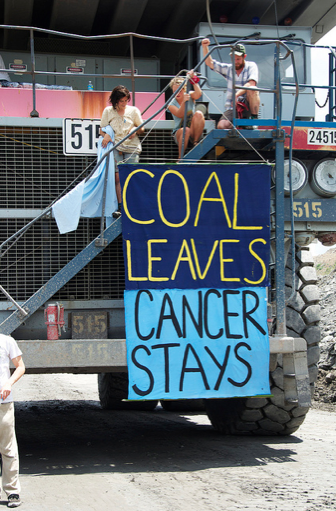Anti-mining protests heat up in West Virginia as evidence of damage builds

Protests are heating up over mountaintop removal mining in West Virginia at the same time new scientific evidence has emerged of the damage such surface mining is causing to human health and the environment.
More than 50 protesters walked onto the Hobet 45 mining complex in Lincoln County, W.Va. on Saturday, with several locking themselves to a truck while holding banners that said, "Coal leaves; cancer stays" and "Restore our mountains; re-employ our miners." The protesters are affiliated with Radical Action for Mountain People's Survival (RAMPS), a nonviolent direct action campaign that aims to end all forms of strip mining in Appalachia.
Twenty people were arrested in the action, with bail set at $25,000 each. Most were charged with trespassing and obstruction. Some of the arrestees have alleged they were beaten by authorities while in custody.
Owned by St. Louis-based mining giant Patriot Coal Corp., the Hobet operation is the largest surface mine in West Virginia and was granted a permit by the Obama administration two years ago. Patriot is currently going through Chapter 11 bankruptcy proceedings, with union contracts and pensions potentially at stake.
The protests come amid mounting evidence of the damages that surface coal mining does to the health of nearby communities and the downstream environment.
The U.S. Geological Survey recently reported finding high levels of toxic compounds in the soil and water around mountaintop removal mining sites in southern West Virginia. Bill Orem, the USGS research geochemist who led the research, reports that mining areas have elevated levels of cancer-causing polycyclic aromatic hydrocarbons in soil and streams and elevated particle pollution in the air.
Meanwhile, a new study by scientists with Duke University in North Carolina and Baylor University in Texas found that water pollution from surface coal mining has degraded 22 percent of streams and rivers in southern West Virginia to the point they may now qualify as impaired under state criteria. The study appears in the peer-reviewed journal Environmental Science & Technology.
"It's important to recognize that surface coal mining pollution doesn't stop at mine-permit boundaries," says Brian D. Lutz, a postdoctoral associate at Duke's Nicholas School of the Environment.
These studies join a growing body of scientific documentation of serious health disparities afflicting Appalachian mining communities, as the Center for Public Integrity's iWatch News recently reported:
West Virginia ranks last among the states in physical health and overall well-being, the 2011 Gallup Healthways Well-Being Index found. Kentucky’s 5th Congressional District, where much mountaintop-removal mining takes place, ranks at the bottom of America’s 436 districts in terms of physical health. West Virginia’s 3rd District comes in at No. 435.
Numerous peer-reviewed studies, including more than a dozen by Michael Hendryx of West Virginia University and various co-authors from 2007 to 2011, have pointed to severe health problems in central Appalachia. People living near mountaintop mining sites had cancer rates 50 percent higher than residents of non-mining areas, the studies said. Rates of birth defects were 42 percent higher. Mortality rates were also significantly elevated, even after researchers adjusted for factors such as smoking, alcohol use and access to health care.
Activists are currently pushing for the passage of a bill that's been introduced in the U.S. House titled the Appalachian Communities Health Emergency (ACHE) Act. H.R. 5959 would place a moratorium on permitting for mountaintop removal coal mining until health studies are conducted by the Department of Health and Human Services.
The bill's primary sponsor is Rep. Dennis Kucinich (D-Ohio). Of the measure's 18 co-sponsors, only two are from Appalachian coal mining states -- Rep. James Moran (D-Va.) and Rep. John Yarmuth (D-Ky.).
(Photo of the July 28 protest courtesy of Mountain Justice's Flickr stream.)
Tags
Sue Sturgis
Sue is the former editorial director of Facing South and the Institute for Southern Studies.
